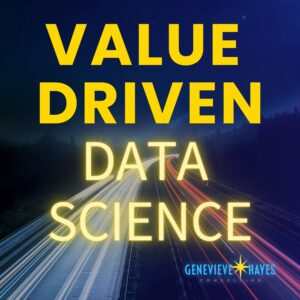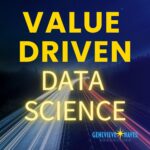Every data scientist knows the sinking feeling: you’ve done brilliant technical work, but your presentation falls flat with stakeholders.
In this Value Boost episode, communications expert Lauren Lang and data analyst Dr Matt Hoffman join Dr Genevieve Hayes to share their go-to pre-presentation checklist to ensure that sinking feeling never happens again.
You’ll walk away knowing:
- The critical business context most data scientists overlook when presenting their work [02:10]
- How to ensure your technical content works as hard as you do – whether presented live or shared asynchronously [04:42]
- The “so what” framework that instantly makes your analysis more compelling to leaders [06:57]
Guest Bio
Lauren Lang is the Director of Content for Uplevel and is also a Content Strategy Coach for B2B marketers.
Dr Matt Hoffman is a Senior Data Analyst: Strategic Insights at Uplevel and holds a PhD in Physics from the University of Washington.
Links
- Connect with Genevieve on LinkedIn
- Be among the first to hear about the release of each new podcast episode by signing up HERE
[00:00:00] Dr Genevieve Hayes: Hello and welcome to your value boost from value driven data science, the podcast that helps data scientists transform their technical expertise into tangible business value, career autonomy and financial reward. I’m Dr. Genevieve Hayes, and I’m here again with communications expert, Lauren Lang, director of content at Uplevel, and data analyst, Dr.
[00:00:24] Matt Hoffman, product manager at Uplevel, to turbo charge your data science career in less time than it takes to run a simple query. In today’s episode, we’re going to be discussing the most important questions data scientists can ask themselves before presenting any models or analysis to maximize the business impact of their work.
[00:00:47] So welcome back Lauren and Matt.
[00:00:50] Lauren Lang: Thank you. Glad to be back.
[00:00:52] Dr Matt Hoffman: Hello again.
[00:00:53] Dr Genevieve Hayes: In the longer conversation we had in our previous episode, we did a deep dive into a project the two of you recently collaborated on at Uplevel, where you combined And that’s data insights with Lauren’s communication expertise to produce significant business results.
[00:01:11] After hearing your story, it made me wish that I had had the benefit of working with communications experts in the various jobs I’ve had. Unfortunately, many of the organizations I’ve worked for didn’t even have an internal communications team, or if they did, it wasn’t in their job description to assist the data science team in crafting their message.
[00:01:34] Because of that, I’ve found myself creating a mental checklist of questions that I’d ask myself before presenting my work to increase my chances of success. So what I’d like to ask each of you today is what is one essential question that data scientists Can ask before delivering a presentation to transform how their analysis lands.
[00:02:04] So Lauren, as a communications expert, what would your one essential question be?
[00:02:10] Lauren Lang: One essential question would be, what are the business goals or OKRs that the company is currently facing? What is the single biggest Problem or initiative that the company is rallying around right now, and the reason for that is this is the world in which your audience is living in when you are doing a presentation
[00:02:37] you have to understand who you’re talking to and understand what their concerns are. And what is keeping them up at night? And what are they thinking about? And what are they prioritizing? And I think sometimes we present data, but we don’t connect it back to the actual business value that our work is bringing.
[00:02:56] And I think that that’s a. Negative, not only for the business, but for us as the presenters of information, it’s not showing our value in what we are contributing to the business. So, I think the more that you can contextualize how the work that you’re doing rolls up or connects to these larger business initiatives is just really important.
[00:03:18] And not only knowing that yourself, but making that very explicit, to the people that you’re communicating to do they know could be a secondary question. You asked for 1, I’m giving you 2. Do they know how relevant or important? My work is to the goals of the business. Because sometimes they don’t, sometimes when things get a little bit abstract or a little bit technical or out of the general wheelhouse of what executives understand, they may not understand what goal.
[00:03:49] You are trying to roll the work up into, so I think it’s really important to just make sure that you are communicating that clearly to them, even if you are very clear about what business value you’re bringing.
[00:04:01] Dr Genevieve Hayes: Yeah. From my experience, I’ve seen a lot of data scientists give a presentation, which is, Hey, look at this cool model I’ve built, but they never say, and if you use this cool model I’ve built, this will save you a hundred thousand dollars per year in this expense or whatever the key metric is. They always.
[00:04:22] Forget that final step.
[00:04:24] Lauren Lang: Right, and that’s the one step. You never want to drop because that’s the one that gets people really excited about what you do and helps to show your value that you’re bringing to the organization.
[00:04:35] Dr Genevieve Hayes: So turning to you, Matt, from your experience as a data analyst, what would your one essential question be?
[00:04:42] Dr Matt Hoffman: My question would be, what’s the life cycle of whatever artifact I’m using to present on? So I’ll give you an example. If it’s going to be a presentation that I’m going to go do, and I’m standing side by side, I can have slides that are Very minimally supported because I am the voice that’s going to be sharing the information that users need to have to understand the context of the work and all of that.
[00:05:11] If that deck is going to get shared out to other people asynchronously, now it’s insufficient. It doesn’t have enough explanation. It can’t be used later. Similarly, if I write a paper. It needs to be concise enough that an executive audience could read it, skim it in a minute, and be able to get some of the takeaways.
[00:05:31] So really, what is the life cycle of whatever we’re creating? Who’s going to be using it? What’s their experience? What’s their technical expertise with the subject matter? By really empathizing and understanding the scope of your entire audiences really helps you make much more impactful presentations and artifacts that can support your work.
[00:05:54] Setting aside how hard the work it was to do itself. I would also add that understanding that at the very beginning of your project as you’re even building your models, building your data analyst, really understanding the business problem, the business context and your users doing that throughout really helps you make more impactful data science work as well as presented out.
[00:06:19] Dr Genevieve Hayes: So basically know your audience.
[00:06:21] Dr Matt Hoffman: Know your audience and know the context that matters to them. And I would extremely advise that data scientists get involved in the conversations themselves and are in the rooms where some of these decisions happen to really understand their users and their audience the best.
[00:06:39] Dr Genevieve Hayes: For me, the one essential question would have to be so what, which is basically building on what both of you have just said. That’s something a former boss of mine used to always ask about my work. So, I would be the data scientist who went to him with, Hey, look at this cool model that I built.
[00:06:57] And before I even got to presenting to the board or the executive, he would always say to me, Hmm, that’s really nice. So what? And so that got me into that habit of, just taking the final step and saying, So. This is a cool model and so it will save you lots and lots of money,
[00:07:18] and yeah, big surprise once I started asking myself that the presentations that I was giving ended up being more successful. So, that is my one essential question so, in summary, the three questions we’ve got that every data scientist should ask before , every presentation what are the key metrics that your stakeholders are focused on Who are your stakeholders that will be reading whatever you produce from your work and so what?
[00:07:52] How do you connect your work back to those key metrics for those stakeholders that you’ve identified? And sounds like if you do that, then you’re on a path to a winning, successful deliverable.
[00:08:08] Lauren Lang: I like it. Yeah.
[00:08:11] Dr Genevieve Hayes: Okay, so that’s a wrap for today’s value boost, but if you want more insights from Lauren and Matt, you’re in luck. We’ve got a longer episode with them where we dive deeper into their strategies for transforming complex technical findings into compelling business narratives. And it’s packed with no nonsense advice for turning your data skills into serious cloud cash and career freedom.
[00:08:38] You can find it now wherever you found this episode or on your favorite podcast platform. Thanks for joining me again, Lauren and Matt.
[00:08:48] Lauren Lang: Thank you so much.
[00:08:49] Dr Matt Hoffman: Thanks for having us.
[00:08:50] Dr Genevieve Hayes: And for those in the audience, thanks for listening. I’m Dr. Genevieve Hayes, and this has been Value Driven Data Science.


